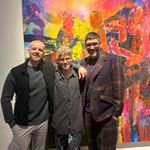Joy Labinjo
We meet leading British-Nigerian artist Joy Labinjo to discuss her solo exhibition of self-portraits in Lagos at Tiwani Contemporary, her giant public mural for Brixton underground station and her major institutional solo show at Chapter Gallery, Cardiff.
Joy Labinjo’s large-scale figurative paintings often depict intimate scenes of historical and contemporary life, both real and imagined and often based on figures appearing in personal and archival imagery that include family photographs, found images and historical material. In the past, she has explored themes including but not limited to identity, political voice, power, Blackness, race, history, community and family and their role in contemporary experience.
Exploring multiple modes of representation including abstraction, naturalism, flatness and graphic patterns, Labinjo’s ‘collage aesthetic’ comprises an eclectic visual vocabulary and mixed painterly techniques which echo her experience of multiple identities – growing up Black, British, Nigerian in the 90s and early 00s.
Comprising a series of nude self-portraits – her only works of such kind to date, the exhibition unfolds an interest in the significance of the nude in the history of visual art and contemporary public practices of sending nude digital imagery for example to lovers. These large scale works translate images that Labinjo took using her phone. Each work comprises loose geometric color blocks where her body can be likened to a variegated landscape. Capturing a range of poses, the works are resolutely frank and unapologetic. In this way, they assert an acceptance of self that is divergent from performative nudity and highlight self-love as erotic and feminine and at odds with patriarchy and sexism. Labinjo’s figure is emphasized by muted and simplified backgrounds, distinct from the dense compositions of her earlier paintings. Departing in colour and composition from previous works, these works present muted earth tones alongside a solitude that dominates each image and contrast with the vivid, saturated colours and social exchanges shown in earlier paintings. She continues to hone distorted renderings that percolate between abstraction and representation. Each work positions Labinjo’s body against a new beginning or a space to be populated by unforeseen content.
In the context of historical and contemporary events in Nigeria, the works also recall the significance of female nudity and its link to collective action in the West African country. In the early 20th century, numerous accounts emerged of women using their nude body to dissent against onerous taxation structures and unfair laws during the country’s colonial period. More recently, Nigerian women have threatened and used naked protest against a range of happenings in the country including the abduction of school girls in Chibok in the north-east and, in the north, anti-violence in Kaduna respectively.
As such, Labinjo’s work presents the body as a political agent and platform. By portraying herself nude, she invites the viewer to consider the artist’s position, and the cultural loads that cover the body. Labinjo obscures reference to place, time, and social affiliation and prioritizes her self-perspective, removing much of the representational content that took precedence in earlier work. These works imitate a personal relationship between Labinjo and her body and present a point through which the artist is able to build associations that inform her interpretations of her surroundings and crucially, her own body.
Follow @JoyLabinjo and @TiwaniContemporary.
Hosted on Acast. See acast.com/privacy for more information.









